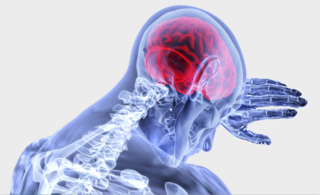Coronavirus Disease 2019
Mental Health Effects of COVID-19 Infection
The purported respiratory infection can have profound effects on the brain.
Posted September 26, 2020 Reviewed by Devon Frye
After nine months of living in a pandemic of the respiratory infection, COVID-19, we know a lot about the multi-systemic effects of SARS-CoV-2, the virus that causes it. In most people, it acts like a regular old common cold, but some get severe illness and other complications such as pneumonia, heart inflammation, blood clotting problems (that can lead to strokes, ischemic limbs, or even disseminated bleeding), COVID toes, and other multi-system inflammatory disorders. Not surprisingly, this illness can also affect the brain.

People very ill hospitalized with COVID-19 are at high risk of developing delirium, a disorder characterized by fluctuating attention and disorientation, emotional extremes, agitation, paranoia, or sometimes the opposite, a very flat emotional expression, and hallucinations. The sleep-wake cycle is usually disrupted, and the delirium classically gets worse as the day progresses.
It wasn’t uncommon for me to see a patient in the medical ward of the hospital who was perfectly alert and aware in the morning, and by 4 pm he might be hallucinating or tell me that he was attending a fall harvest fair when asked where he thought he was staying. Delirium in hospitals is a frequent occurrence, affecting 10 to 15 percent of hospitalized on the general medical floors and 50 to 70 percent of patients in the ICU. Delirium can be caused by all sorts of things—infections, medications, withdrawal, surgery—and it seems to be a common brain reaction to serious illness or consciousness-altering medications. Delirium is associated with longer hospital stays, more complications, and a higher risk of death.
Treating delirium involves careful monitoring of medications and withdrawal, treating underlying infections, and making sure there are plenty of cues in the hospital room about time, date, and familiar items for the patients such as a photograph of the family at the bedside. In the context of COVID-19, much longer than normal ICU stays under heavy sedation and restrictions on visitation from family mean delirium is extremely likely for very ill patients.
Besides delirium, SARS-CoV-2 can have direct effects on the brain and nervous system. There have been documented cases of encephalitis (brain infection), spinal cord infection, seizures, nerve damage, neurodegeneration, and neuroinflammation. SARS-CoV-2 particles have been found in the brain. High levels of brain inflammation can lead to symptoms such as memory loss, cognitive fog, and/or depression, which can sometimes last for significant periods after the acute infection with the virus. Up to 45 percent of patients in the hospital experience some sort of neurological symptom.

While most COVID-19 patients are never hospitalized and have a full recovery, there is a growing cohort of COVID “long-haulers” who still have symptoms months after the initial infection. Many of these patients were never ill enough to be in the hospital, but experience long-term fevers, crippling fatigue, cognitive fog, fluctuations in vital signs such as tachycardia (high heart rate), and/or inability of the body’s blood pressure regulation system to compensate for postural changes, leading to dizziness on standing or changing position.
A psychiatrist, Dr. Mady Hornig, who studied myalgic encephalomyelitis/chronic fatigue syndrome (ME/CFS) at Columbia, was left with chronic fatigue herself after a presumed COVID-19 infection in March. For weeks after becoming ill, she was often so tired “I felt like I could not do anything further—my brain was just empty.” She has designed studies and, using NIH and non-profit funding, developed a registry to follow and better understand these symptoms in the wake of the pandemic.
COVID-19 is not just a respiratory illness; it can have profound effects on the brain. Understanding these pathologies can help us treat those who become ill in 2020, but also learn about the mental health consequences of other infections, and prepare us for the next pandemic.
Copyright Emily Deans, M.D.
References


